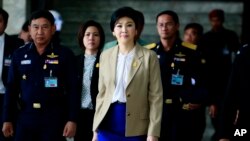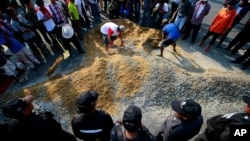BANGKOK —
Thailand's anti-corruption commission has charged the country's caretaker prime minister with negligence‚ an action that could force her ouster from office.
The National Anti-Corruption Commission said Yingluck Shinawatra has until March 14 to answer the dereliction of duty charge against her.
Norawich Lalaeng, one of the attorneys for the acting prime minister, said Yingluck is confident she has not done anything illegal.
According to the lawyer, the prime minister is willing to cooperate with the commission, give information and evidence because she is confident of her honesty. The attorney said the rice-pledging scheme at the heart of the allegations benefited Thailand's farmers.
But if the case does not go her way, it could lead to impeachment by the Senate or criminal charges against Yingluck.
She is accused of knowing about corruption in the rice project and failing to stop it.
Several hundred of her supporters, known as the "Red Shirts," blocked access to the commission's headquarters, just north of the capital (in Nonthaburi province) before the hearing began. They attempted to bar commissioners from entering, demanding they all resign and accusing the body of bias against Yingluck. Several of the pro-government protestors chained themselves to an entrance gate.
The hearing was shifted to a nearby government building.
Rice scheme
The rice scheme, tainted by allegations of corruption‚ has been considered an essential policy for Yingluck's administration, ensuring the support of millions of farmers who were paid above market price for their crops. But the fund has run out of money.
With payments delayed to the farmers, many of Yingluck's core supporters have been wavering. A promise last week of quick payments gave her some respite, with farmers on tractors making a U-turn after heading towards the capital to demand immediate payment.
If they had continued to the capital, that would have added to the chaos on Bangkok's major streets, where anti-government "yellow shirt" and other demonstrators for weeks have occupied key intersections. They have erected stages and hundreds of tents as part of their "Shutdown Bangkok" campaign that is to continue until Yingluck is ousted.
The leader of those protests is former deputy prime minister, Suthep Thaugsuban. He faces murder charges for the 2010 crackdown on Red Shirt demonstrations. After vowing he would never speak with Yingluck, he reversed his stance and said he would talk with her. But only in the form of a live debate televised on every national channel.
Speaking to reporters, Yingluck indicated that before negotiations could occur Suthep would first have to halt the protests so the truncated election process could resume.
Suthep contends elections are not viable because Yingluck's supporters can effectively buy their way back into office. He wants an unelected council to run the country for an indefinite period of time.
Violence in and around the capital has escalated in the past week with frequent grenade attacks and shootings. Four children were among those killed in the latest wave of violence.
There is scant police presence on the streets of the capital.
Thailand's army, ostensibly neutral, but viewed by analysts as sympathetic to those wanting to oust Yingluck, has begun expanding checkpoints in the capital. However generals have been reiterating they have no intention on carrying out another coup.
The military ousted Yingluck's brother, Thaksin Shinawtra, from the prime minister's office in 2006. That set off an extended period of sometimes deadly political struggle.
The ultimate authority in the country, 86-year-old King Bhumibol Adulyadej, is frail and has not intervened. In a halting address to the nation on his birthday last December, he did call for all to work together "for the good of the whole country."
The National Anti-Corruption Commission said Yingluck Shinawatra has until March 14 to answer the dereliction of duty charge against her.
Norawich Lalaeng, one of the attorneys for the acting prime minister, said Yingluck is confident she has not done anything illegal.
According to the lawyer, the prime minister is willing to cooperate with the commission, give information and evidence because she is confident of her honesty. The attorney said the rice-pledging scheme at the heart of the allegations benefited Thailand's farmers.
But if the case does not go her way, it could lead to impeachment by the Senate or criminal charges against Yingluck.
She is accused of knowing about corruption in the rice project and failing to stop it.
Several hundred of her supporters, known as the "Red Shirts," blocked access to the commission's headquarters, just north of the capital (in Nonthaburi province) before the hearing began. They attempted to bar commissioners from entering, demanding they all resign and accusing the body of bias against Yingluck. Several of the pro-government protestors chained themselves to an entrance gate.
The hearing was shifted to a nearby government building.
Rice scheme
The rice scheme, tainted by allegations of corruption‚ has been considered an essential policy for Yingluck's administration, ensuring the support of millions of farmers who were paid above market price for their crops. But the fund has run out of money.
With payments delayed to the farmers, many of Yingluck's core supporters have been wavering. A promise last week of quick payments gave her some respite, with farmers on tractors making a U-turn after heading towards the capital to demand immediate payment.
If they had continued to the capital, that would have added to the chaos on Bangkok's major streets, where anti-government "yellow shirt" and other demonstrators for weeks have occupied key intersections. They have erected stages and hundreds of tents as part of their "Shutdown Bangkok" campaign that is to continue until Yingluck is ousted.
Suthep Thaugsuban
Suthep Thaugsuban- 64 years old
- Deputy prime minister from 2008-2011
- Member of administration that authorized 2010 crackdown on anti-government protesters
- Faces murder charges related to that crackdown
- Resigned from opposition Democrat Party to lead current protests
- Has served as agriculture and communication ministers
- Accused of giving the rich land rights under a program meant for the poor in 1995
Speaking to reporters, Yingluck indicated that before negotiations could occur Suthep would first have to halt the protests so the truncated election process could resume.
Suthep contends elections are not viable because Yingluck's supporters can effectively buy their way back into office. He wants an unelected council to run the country for an indefinite period of time.
Violence in and around the capital has escalated in the past week with frequent grenade attacks and shootings. Four children were among those killed in the latest wave of violence.
There is scant police presence on the streets of the capital.
Thailand's army, ostensibly neutral, but viewed by analysts as sympathetic to those wanting to oust Yingluck, has begun expanding checkpoints in the capital. However generals have been reiterating they have no intention on carrying out another coup.
The military ousted Yingluck's brother, Thaksin Shinawtra, from the prime minister's office in 2006. That set off an extended period of sometimes deadly political struggle.
The ultimate authority in the country, 86-year-old King Bhumibol Adulyadej, is frail and has not intervened. In a halting address to the nation on his birthday last December, he did call for all to work together "for the good of the whole country."






